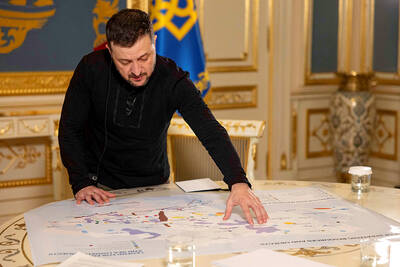Vietnam yesterday faced criticism from the US and rights groups after jailing three pro-democracy bloggers weeks ahead of the National Congress of the Communist Party of Vietnam.
The run-up to a leadership transition later this month is a particularly tense period for the government as candidates jostle for power behind closed doors.
In the past few months, the authoritarian regime has stepped up its crackdown on dissent and has arrested numerous critics.
At a quick trial on Tuesday in Ho Chi Minh City, three critics of the government who belong to the outlawed Independent Journalists Association of Vietnam (IJAV) were sentenced to jail for “making and disseminating information against” Vietnam.
Writer Pham Chi Dung, 54, founding member and president of IJAV, was jailed for 15 years, while military veteran Nguyen Tuong Thuy, 69, was sentenced to 11 years.
A younger member of the group, Le Huu Minh Tuan, was also handed an 11-year term.
The US — which, despite war memories, has a warming relationship with Vietnam led by shared concerns on China — said it was “disappointed” by the sentences.
“These harsh sentences are the latest in a worrisome trend of arrests and convictions aimed at Vietnamese citizens exercising rights enshrined in Vietnam’s constitution,” a US Department of State spokesperson said in Washington.
“We urge the Vietnamese government to ensure its actions are consistent with the human rights provisions of its constitution and its international obligations and commitments,” the spokesperson said.
The imprisoned trio are well-known for calling for greater democracy in Vietnam.
Lawyer Nguyen Van Mieng told reporters that they admitted writing articles “to support freedom of speech and other democratic rights,” but denied spreading information against the communist regime.
According to the court’s verdict cited by state-run media, the three “had regularly been in contact with regime opponents” prior to their arrests in late 2019 and the middle of last year.
Dung had written articles for foreign media agencies with “the purpose of changing Vietnam’s political system,” it said.
The defendants’ behavior posed “a danger to society ... causing separation in social unity and people,” it added.
Amnesty International deputy regional director Emerlynn Gil said the sentences showed the depths of Vietnam’s censorship “even by its own deeply repressive standards.”
“These journalists’ only crime was daring to discuss politics and other matters of public interest,” she said.
Radio Free Asia, the US government-funded broadcaster where Thuy contributed commentary, called for his immediate release.
“The harsh sentencing of Thuy and two other independent journalists is a blatant assault on basic freedoms and flies in the face of the freedom of expression enshrined in Vietnam’s constitution,” Radio Free Asia president Stephen Yates said.
There are more than 170 prisoners of conscience imprisoned in Vietnam, Amnesty has said.
Last month, writer and poet Tran Duc Thach was sentenced to 12 years for his articles critical of the government posted on Facebook, nearly a decade after being released from prison for a similar offense.
The party congress is to take place from Jan. 25 to Feb. 2 in Hanoi.

Thousands gathered across New Zealand yesterday to celebrate the signing of the country’s founding document and some called for an end to government policies that critics say erode the rights promised to the indigenous Maori population. As the sun rose on the dawn service at Waitangi where the Treaty of Waitangi was first signed between the British Crown and Maori chiefs in 1840, some community leaders called on the government to honor promises made 185 years ago. The call was repeated at peaceful rallies that drew several hundred people later in the day. “This government is attacking tangata whenua [indigenous people] on all

RIGHTS FEARS: A protester said Beijing would use the embassy to catch and send Hong Kongers to China, while a lawmaker said Chinese agents had threatened Britons Hundreds of demonstrators on Saturday protested at a site earmarked for Beijing’s controversial new embassy in London over human rights and security concerns. The new embassy — if approved by the British government — would be the “biggest Chinese embassy in Europe,” one lawmaker said earlier. Protester Iona Boswell, a 40-year-old social worker, said there was “no need for a mega embassy here” and that she believed it would be used to facilitate the “harassment of dissidents.” China has for several years been trying to relocate its embassy, currently in the British capital’s upmarket Marylebone district, to the sprawling historic site in the

‘IMPOSSIBLE’: The authors of the study, which was published in an environment journal, said that the findings appeared grim, but that honesty is necessary for change Holding long-term global warming to 2°C — the fallback target of the Paris climate accord — is now “impossible,” according to a new analysis published by leading scientists. Led by renowned climatologist James Hansen, the paper appears in the journal Environment: Science and Policy for Sustainable Development and concludes that Earth’s climate is more sensitive to rising greenhouse gas emissions than previously thought. Compounding the crisis, Hansen and colleagues argued, is a recent decline in sunlight-blocking aerosol pollution from the shipping industry, which had been mitigating some of the warming. An ambitious climate change scenario outlined by the UN’s climate

BACK TO BATTLE: North Korean soldiers have returned to the front lines in Russia’s Kursk region after earlier reports that Moscow had withdrawn them following heavy losses Ukrainian President Volodymyr Zelenskiy on Friday pored over a once-classified map of vast deposits of rare earths and other critical minerals as part of a push to appeal to US President Donald Trump’s penchant for a deal. The US president, whose administration is pressing for a rapid end to Ukraine’s war with Russia, on Monday said he wanted Ukraine to supply the US with rare earths and other minerals in return for financially supporting its war effort. “If we are talking about a deal, then let’s do a deal, we are only for it,” Zelenskiy said, emphasizing Ukraine’s need for security guarantees